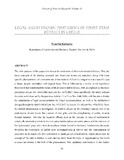| dc.description.abstract | The main purpose of this paper is to dissect the institution of short-term rental in Greccc. First, the basic concepts of the sharing economy and short-term rentals are analyzed; along with those specific characteristics of short-tenn rental that make it di1Ticult to categorize it as a specific type of leasc, despite similarities with typical lease. This is followed by a review of the legislativc framework that detennined thc nature of short-term rental in Greece, with an emphasis on the basic provisions of Law No. 4446/2016 and Law No. 447212017. More specifically, the study outlines the main restrictions set by the previous Article III of Law No. 4446/2016, with the aim to hinder the substitution of legal accommodation by illegal accommodation, as well as thc institutional changcs brought by Article 84 of Law No. 4472/2017 to Article 111 of Law No. 4446/2016. Next, the Airbnb phenomenon is investigated: its positive effects on the economy-mainly due to the
exploitation of real estate, the creation of new jobs, and the strengthening of public revenue through taxation but also the ncgative cffects, such as thc incrcase in rates of conventional rentals, the increasing trends in the rcal estate market prices and rental prices and the removal of the "permanent" population from those places where Airbnb is dominant. Furthermore, the study describes the oversupply of Airbnb-type accommodation in Greece and the concentration of
propelties in the hands of a few individuals or small groups of individuals, which shows that the concept of the said institution is now moving away from the logic of supplementing the host's income that existed at the birth of the phenomenon. The regulatory interventions in the Airbnb market in Greeee are also analyzed, with the aim oflimiting arbitrariness due to the abuse of the institution, The paper also presents the consequences of the Covid-19 pandemic on short-term rentals and short-term rentals' impact on the hospitality industry in Greece, The study concludes that only with the adoption of some useful legal restrictions will short-tem1 rentals not end up as a controlling instrument in the hands of a few individuals, but will remain within the framework of the "sharing economy" and not simply become a "platform economy", | en_UK |


